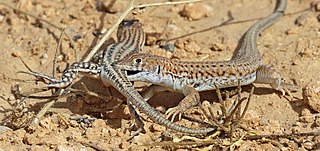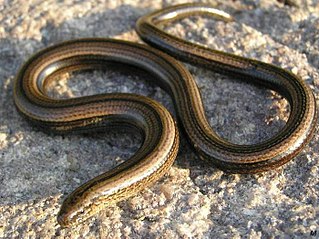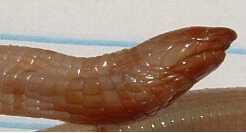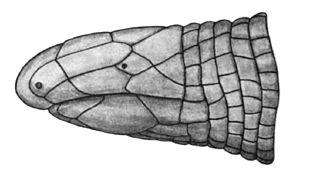
Amphisbaenia is a group of typically legless lizards, comprising over 200 extant species. Amphisbaenians are characterized by their long bodies, the reduction or loss of the limbs, and rudimentary eyes. As many species have a pink body and scales arranged in rings, they have a superficial resemblance to earthworms. While the genus Bipes retains forelimbs, all other genera are limbless. Phylogenetic studies suggest that they are nested within Lacertoidea, closely related to the lizard family Lacertidae. Amphisbaenians are widely distributed, occurring in North America, Europe, Africa, South America, Western Asia and the Caribbean. Most species are less than 6 inches (15 cm) long.

Aprasia is a genus of lizards in the family Pygopodidae. The genus is endemic to Australia. The species in the genus Aprasia are worm-like, burrowing lizards. At least four of the species are oviparous.

Acanthodactylus is a genus of lacertid lizards, commonly referred to as fringe-fingered lizards, fringe-toed lizards, and spiny-toed lizards.

Ophiodes is a genus of South American legless lizards in the family Diploglossidae.

Legless lizard may refer to any of several groups of lizards that have independently lost limbs or reduced them to the point of being of no use in locomotion. It is the common name for the family Pygopodidae. These lizards are often distinguishable from snakes on the basis of one or more of the following characteristics: possessing eyelids, possessing external ear openings, lack of broad belly scales, notched rather than forked tongue, having two more-or-less-equal lungs, and/or having a very long tail. Every stage of reduction of the shoulder girdle —including complete loss— occurs among limbless squamates, but the pelvic girdle is never completely lost regardless of the degree of limb reduction or loss. At least the ilium is retained in limbless lizards and most basal snakes.

Blanus, also known as worm lizards, are a genus of amphisbaenians found in the Mediterranean region of Europe and North Africa. Like other amphisbaenians, Blanus species are specialized for a subterranean existence, with long, slender bodies, reduced limbs, and rudimentary eyes. Their skulls are powerfully constructed, allowing them to push through soil to create a burrow. Their jaws are well-developed, with large, recurved teeth and a pair of canine-like teeth in the upper jaw.

Rhineura is a genus of worm lizard endemic to North America. The genus has only one extant species but more are known from fossil record. They are also known as the North American worm lizards.

Zarudny's worm lizard is a species of amphisbaenian reptile in the family Trogonophidae. The species is monotypic within the genus Diplometopon. The species is native to the Middle East.
The angled worm lizard is a species of reptile in the family Trogonophidae. It is found in Somalia in the Horn of Africa. Markings on specimens of Agamodon anguliceps are mottled as yellowish white with darker brown markings along the side of the lizard. The anatomical skull structure of the angled worm lizard features a short, sharp angle between the occipitoparietal and facial plane region.

The Arabian worm lizard is a species of reptiles in the family Trogonophidae. It is found in the southern part of the Arabian Peninsula in Yemen. The population is unknown as it has only been recorded in the past 100 years. The threats are also unknown but does not seem to be threatened by Yemen's small-scale agriculture. Not much is known about this species hence the data deficient status.

Amphisbaena is a genus in the family Amphisbaenidae, commonly known as worm lizards. Over 100 species are placed in this diverse genus.
Arnold G. Kluge is professor emeritus of zoology and curator emeritus of amphibians and reptiles at the University of Michigan, Museum of Zoology.

Chirindia is a genus of amphisbaenians in the family Amphisbaenidae. Commonly known as pink round-headed worm lizards, species in the genus Chirindia are native to East Africa and southern Africa, from Tanzania to South Africa. They are unpigmented worm lizards with rounded heads, and extensive fusion of the head shields.

Cadea is a genus of amphisbaenians, commonly known as Cuban keel-headed worm lizards, in the family Cadeidae. Two species are placed in this genus. Both species are endemic to Cuba.

Cynisca is a genus in the family Amphisbaenidae, commonly known as worm lizards. 20 species are placed in this genus, all of them native to West Africa.

Leposternon is a genus of amphisbaenians in the family Amphisbaenidae. Species in the genus are commonly known as worm lizards. 11 species are placed in this genus.
Monopeltis is a genus of amphisbaenians in the family Amphisbaenidae. Species in the genus are commonly known as worm lizards, even though they are not lizards. The genus is endemic to southern Africa. 19 species are placed in this genus.
The flat worm lizard is a species of reptile in the family Trogonophidae. It is found in Somalia.













